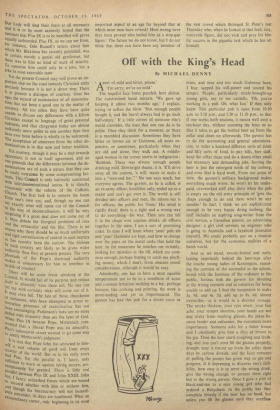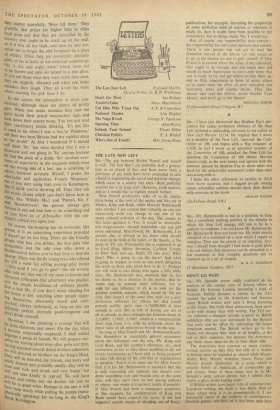Off with the King's Head
By MICHAEL DENNY
‘Atisrr of mild and bitter, please.' `I'm sorry, we've no mild.' The hopeful face looks puzzled, hurt almost. The outstretched hand retreats. 'We gave up keeping it about two months ago,' I explain, trying to soften the blow. 'Not enough people bought it, and the barrel always had to go back half-empty.' If a little corner of someone else's world crumbles, the least that one can do is be polite. Then they think for a moment, or there is a mumbled discussion. Sometimes they have bitter or brown ale or Guinness, all more ex- pensive, or sometimes, particularly when they are old and alone, they walk out. A middle- aged woman in the corner snorts in indignation: `Rubbish. There was always enough people drinking mild. Downright shame, it is. 'E'll drive away all the custom, 'e will; wants to make it into a "west-end bar."' No one says much, but everyone agrees. The guvnor, as he is called, is an ex-army officer, hostilities only, ended up as a major and can't get over it. The world is still divided into officers and men, the saloon bar is for officers, the public for 'them.' His mind is rigidly fixed; there is a right and a wrong way to do everything—his way. Then you can tell it to the chaps over copious drinks, all officers together in the mess. I am a sort of promising cadet. In time I will learn where 'your' pale ale and 'your' Guinness are kept, and how to change over the pipes on the metal casks that hold the beer. In the meantime he watches me irritably, looking for mistakes in the till, which are com- mon enough, perhaps hoping to catch me pinch- ing money, which I don't, from obscure moral considerations, although it would be easy.
Admittedly, one has to have a most equable temperament not to be in a condition of acute and constant irritation working in a bar, perhaps because, like cooking and printing, the work is never-ending and yet so impermanent. The guvnor has had this pub for a dozen years or more, and time and too much Guinness have, I fear, sapped his will-power and soured his temper. People, particularly nicely-brought-up young girls, say to me casually, 'Oh, you're working in a pub. Oh, what fun.' If they only knew. This particular pub is open from 10.30 a.m. to 3.10 p.m., and 5.30 to 11.10 p.m., so that if one works both sessions, it means well over a ten-hour day, without counting the hour or so that it takes to get the bottled beer up from the cellar and clean up afterwards. The guvnor has to do the accounting and general administra- tion, to order a hundred different sorts of drink and fifty sorts of food, to pay bills, hire staff, keep the cellar clean and do a dozen other small but necessary and demanding jobs. Serving the beer is just the emergent ninth of the iceberg, and even that is hard work. From our point of view, the guvnor's military background makes everything much worse; he won't let his under- paid. overworked staff play darts when the pub is empty on the old army principle of 'give the chaps enough to do and there won't be any trouble.' In fact, I think we are sophisticated enough to be very happy doing nothing; the staff includes an aspiring song-writer from the civil service, a Canadian painter, an advertising designer, a girl civil servant, an engineer who is going to Australia and a layabout journalist (myself). We could probably put on a musical ourselves, but for the economic realities of a harsh world.
And so we stand, sweaty-footed and surly, lusting impotently behind the beer-taps after the kindle young ladies of Kensington, resent- ing the curtness of the successful in the saloon, bored with the fussiness of the ordinary in the public, furious with the guvnor for shouting at the wrong moment and at ourselves for being unable to add up. I find the temptation to make 3s. 9d. and 4s. 5d. add up to 8s. 4d. almost irresistible--as it would in a decimal coinage. The smoke thickens, your eyes smart, your feet ache, your temper shortens, your hands are wet and sticky from washing glasses, the jokes be- come louder and unfunnier, the customers more importunate. Someone asks for a bitter lemon and I obediently give him a slice of lemon in his gin. Then the beer starts coughing and froth- ing, and you can't even fill the glasses properly; draught beer is forced up from the cellar these days by carbon dioxide, and the faint romance of pulling the pumps has given way to gas and progress. It is depressing to discover one's falli- bility, how easy it is to serve the wrong drink, give the wrong change, or present them right but to the wrong person. Once I gave a pint of black-and-tan to a nice young girl who had ordered a Babycham. In the public bar they complain bitterly if the beer has no head, but unless you fill the glasses until they overflow they mutter scornfully, `Nice 'Of there.' They grumble that prices are higher than in other local pubs and that they are controlled by the brewery and ought to be stuck up on the wall, as if it was all my fault, and then try and per- suade me to forget the odd twopence on a glass of whisky. Often they are completely unintelli- gible, to me at least, or rise technical terminology like 'a day and night, male,' which turns out to be brown and pale ale mixed in a pint glass. It You ask them what they want more than once, they are mightily offended and when you make mistakes they laugh. They all know far more about running the pub than I do.
In the saloon the atmosphere is more con- strained, although there are plenty of pretty girls. When you make mistakes they (not the girls) brush their pencil moustaches, sigh, and look down their snooty noses. You can just read their reactionary minds thinking, `It's not like it used to be when/I was a boy/at Peshawar/ old Bert was here/Britain had her rightful place in the world.' At first I wondered if I should call them `Sir,' but soon decided that I was a democrat and not going to `Sir' anyone because he had the price of a drink. 'Sir' involves over- tones of superiority in the recipient which, even on the wrong side of a bar, one is unwilling to admit, however accurate. Myself, I prefer the admirable and egalitarian French `Monsieur,' but if ■ • you start using that, even in Kensington, they'll think you're showing off. Then they ask for exotic drinks which you don't know how to Make, like 'Whisky Mac' and Timm's No. 3' and `Screwdrivers'; the guvnor always gets furious if you ask him how to do something and s.° You have to se debrouiller with the cus- tomer's critical eye upon you. Of course, bar-keeping has its moments; like Prison, it is an interesting experience provided It doesn't go on too long. There are the friendly People who buy you drinks, the nice girls who sympathise and the odd ones who down a double-scotch before you've had time to find the change. There was the fly young man who offered ille £30 a week for selling pornographic books Who quid if you go to gaol'—the old woman w no told me that one of my most lecherous and extravert iravert colleagues (the advertiser) was psychic, and the simple kindliness of ordinary people. ,"°I a bad life, if you don't mind standing for iten hours a day, watching other people enjoy- ing themselves, alternately bored and over- itiZked, always underpaid, as long as you are ilitelY patient, eternally good-tempered and don't drink yourself. However, I am planning a revenge that will be both elaborate and sweet. On the day when to become respectably employed, I shall collect ser:ther a posse of friends. We will prepare our- hayI !' by visiting about nine other pubs and then, We will ng acquired several dozen drunken adherents, descend as brothers on the King's Head. They will be bearded, my friends, and hairy and oddly dressed loud _ secl and probably smelly; they will be and rude and drunk and very happy, but will take kindly to reproof. We will have Will bs and rattles and old dustbin lids and we have Le in good voice. Perhaps in the end it will glen worth while pulling the pumps (meta-
Head speaking) for so long in the King's , Kensington.















































 Previous page
Previous page